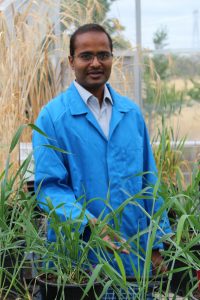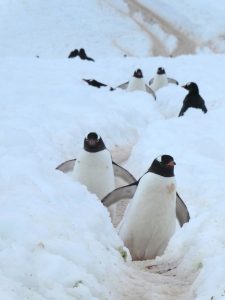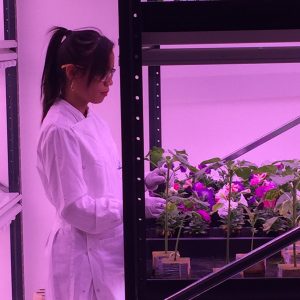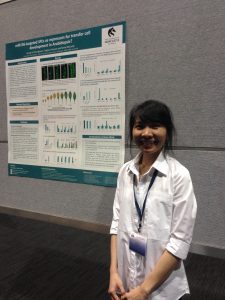- About
- Members
- Join
- Member log in
- Membership Renewal
- Member directory
- Life Members
- ASPS Life Member Professor Graham Farquhar
- ASPS Life Member Associate Professor Hendrik (Hank) Greenway
- ASPS Life Member Dr Marshall (Hal) D Hatch
- ASPS Life Member Dr Paul E Kriedmann
- ASPS Life Member Dr Mervyn Ludlow
- ASPS Life Member Emeritus Professor Rana Munns
- ASPS Life Member Conjoint Professor Christina E Offler
- ASPS Life Member Professor (Charles) Barry Osmond
- ASPS Life Member Emeritus Professor John W Patrick
- ASPS Life Member Dr Joe Wiskich
- Corresponding Members
- Elected Fellows
- Events
- Awards & Funding
- Employment
- Publications
- Research
- Teaching
- Menu
Sambasivam Periyannan – 2016 ASPS Peter Goldacre Award recipient shares his story of success
09 March 2017
SECURING GLOBAL FOOD PRODUCTION BY
RAPID ISOLATION OF WHEAT RUST DISEASE RESISTANCE GENES
Born and raised among the tropical plants on a small farm in Southern India, I never dreamed of becoming a researcher instead of a farmer. With a Master’s in Plant Pathology and a short exposure to the management of diseases in horticultural crops, in 2007, I had the opportunity to migrate to Australia to undertake a PhD at Plant Breeding Institute (PBI), University of Sydney. Until the time, I didn’t realise that PBI is the pioneering centre for fundamental studies on plant-pathogen interactions. With the outbreak of the deadly stem rust fungus Ug99 in East Africa, my PhD project was specifically focused on the molecular genetics of wheat stem rust resistance. At PBI, I was working with Drs Harbans Bariana and Urmil Bansal who are world renowned expertise in identifying and charateristing novel rust resistance genes in wheat. With a year of training on rust pathogenicity, in 2008, I moved to Dr Evans Lagudah’s lab at CSIRO, Canberra to continue the project towards rust resistance gene cloning. I was so excited to join Evan’s lab as it is one among the very few labs of the world which are successful in cloning rust disease resistance genes from the complex wheat genome. Given the complex nature of the wheat genome, it was a challenging project for PhD training. But with emergence of Ug99 as a major threat to global food security, I was highly motivated to succeed and I cloned the first stem rust resistance gene Sr33 from wheat. Further enthusiasm came when the results were published in Science (with cover page highlights) capturing the attention of several media outlets including BBC news (http://www.bbc.com/news/science-environment-23084782).
Du ring that time, I realised that the wheat and the plant science community as a whole was in need of a robust method for isolating disease resistance genes as the conventional map-based gene cloning was tedious and time consuming. Using the resources of Sr33 and in collaboration with Drs Brande Wulff (at John Innes Centre) and Jonathan Jones’ lab (The Sainsbury Laboratory) at Norwich (UK), a rapid resistance gene cloning tool called “Mutagenesis and Resistance gene enrichment and Sequencing (MutRenSeq)” was developed to identify resistance genes within two years, whilst the map-based approach on average requires five years. This new technology was further validated by the successful isolation of two additional stem rust resistance genes, Sr22 and Sr45, which like Sr33, were effective against Ug99 and other wheat stem rust races. Along with the publication of this method in Nature Biotechnology (as a cover page article), the technique holds a patent in the USA. Apart from wheat, this robust gene cloning technique is currently being extended to other agricultural crops such as barley, soybean, potato, tomato and rye.
ring that time, I realised that the wheat and the plant science community as a whole was in need of a robust method for isolating disease resistance genes as the conventional map-based gene cloning was tedious and time consuming. Using the resources of Sr33 and in collaboration with Drs Brande Wulff (at John Innes Centre) and Jonathan Jones’ lab (The Sainsbury Laboratory) at Norwich (UK), a rapid resistance gene cloning tool called “Mutagenesis and Resistance gene enrichment and Sequencing (MutRenSeq)” was developed to identify resistance genes within two years, whilst the map-based approach on average requires five years. This new technology was further validated by the successful isolation of two additional stem rust resistance genes, Sr22 and Sr45, which like Sr33, were effective against Ug99 and other wheat stem rust races. Along with the publication of this method in Nature Biotechnology (as a cover page article), the technique holds a patent in the USA. Apart from wheat, this robust gene cloning technique is currently being extended to other agricultural crops such as barley, soybean, potato, tomato and rye.
With the above achievements, I was fortunate to win the prestigious ASPS “Peter Goldacre Award”. This award contributed to my success in winning a highly competitive Australian Research Council “Discovery Early Career Researcher Award”. My gratitude for both awards has fuelled my hunger for future research success, where I am now identifying the signalling elements and molecular pathways of the cloned rust resistance genes in pathogen infected wheat. As plant pathogens evolve rapidly and become a major problem for securing food production and sustainable agriculture, knowledge of disease resistance gene function is required to help innovate a new generation of robust crops with durable resistance to multiple pathogen varieties.
I would like to acknowledge Sydney University, ACIAR, Durable Rust Resistance in Wheat project and Grains Research and Development Corporation for the scholarship and the research grant to undertake the aforementioend studies. Finally, I thank Drs TJ Higgins, Jeff Ellis and Evans Lagudah at CSIRO for nominating me for the prestigous ASPS Goldacre Award.
Email: Sambasivam.Periyannan@csiro.au
References:
- Steuernagel B#, Periyannan S#, Hernandez-Pinzon I, Witek K, Rouse M, Yu G, Hatta A, Ayliffe M, Bariana H, Jones J, Lagudah E, Wulff B (2016). Rapid cloning of disease-resistance genes in plants using mutagenesis and sequence capture. Nature Biotechnology 34:652-655 ( #joint first author)
- Periyannan S, Moore J, Ayliffe M, Bansal U, Wang X, Huang L, Deal K, Luo M, Kong X, Bariana H, Mago R, McIntosh R, Dodds P, Dvorak J, Lagudah E(2013).The gene Sr33, an ortholog of barley Mla genes, encodes resistance to wheat stem rust race Ug99. Science 341:786-788.
Global Plant Council February E Bulletin
06 March 2017
Your membership is paid to (year, month, day).
|
|||||||||||||||||||||||||||||||||||||
|
|||||||||||||||||||||||||||||||||||||
|
|||||||||||||||||||||||||||||||||||||
|
Global Plant Council February E Bulletin
06 March 2017
Your membership is paid to (year, month, day).
|
|||||||||||||||||||||||||||||||||||||
|
|||||||||||||||||||||||||||||||||||||
|
|||||||||||||||||||||||||||||||||||||
|
Antarctica trip? Apply by Feb 20th
10 February 2017



 The Homeward Bound Initiative
The Homeward Bound Initiative
By Sandra Kerbler
PhD Candidate at the ARC Centre of Excellence in Plant Energy Biology,
The University of Western Australia
If you could change one thing in the world today, what would it be? I’m sure many of you reading this will be thinking of certain political leaders right now, but what about the issues a little closer to home? The ones you face each and every day? What about those that are long engrained, such that we don’t even realise they are there sometimes? Seeing so many of my talented female colleagues leave science because it was just “too competitive” and that they “didn’t have what it takes,” the answer to this question was simple. For me, I would change the gender inequality in science and that’s why I took part in Homeward Bound.
Homeward Bound is a leadership and strategy program for women scientists, set against the backdrop of Antarctica. Created by Australian leadership expert Fabian Dattner in collaboration with Dr Jessica Melbourne-Thomas of the Australian Antarctic Division, the program aims to equip a 1000-strong global collaboration of women scientists with the ability to lead, influence and contribute to policy and decision making, over the next 10 years. Homeward Bound was an incredible experience for me. Not only did has it helped me develop the skills needed to succeed in the upper echelons of science, but being part of a larger collaborative of women, all with a science background and all at very different stages of their careers has been truly inspiring.
If you would similarly like to improve the gender inequality in science and enhance your ability to lead constructively, plan strategically and communicate effectively to both scientists and non-scientists alike, please consider applying for the next Homeward Bound voyage in 2018. Applications close on the 20th February, 2017. For more information, please visit: https://homewardboundprojects.com.au or alternatively contact me directly at: sandra.m.kerbler@gmail.com
Want to go to Antarctica? Apply by Feb 20
10 February 2017



 The Homeward Bound Initiative
The Homeward Bound Initiative
By Sandra Kerbler
PhD Candidate at the ARC Centre of Excellence in Plant Energy Biology,
The University of Western Australia
If you could change one thing in the world today, what would it be? I’m sure many of you reading this will be thinking of certain political leaders right now, but what about the issues a little closer to home? The ones you face each and every day? What about those that are long engrained, such that we don’t even realise they are there sometimes? Seeing so many of my talented female colleagues leave science because it was just “too competitive” and that they “didn’t have what it takes,” the answer to this question was simple. For me, I would change the gender inequality in science and that’s why I took part in Homeward Bound.
Homeward Bound is a leadership and strategy program for women scientists, set against the backdrop of Antarctica. Created by Australian leadership expert Fabian Dattner in collaboration with Dr Jessica Melbourne-Thomas of the Australian Antarctic Division, the program aims to equip a 1000-strong global collaboration of women scientists with the ability to lead, influence and contribute to policy and decision making, over the next 10 years. Homeward Bound was an incredible experience for me. Not only did has it helped me develop the skills needed to succeed in the upper echelons of science, but being part of a larger collaborative of women, all with a science background and all at very different stages of their careers has been truly inspiring.
If you would similarly like to improve the gender inequality in science and enhance your ability to lead constructively, plan strategically and communicate effectively to both scientists and non-scientists alike, please consider applying for the next Homeward Bound voyage in 2018. Applications close on the 20th February, 2017. For more information, please visit: https://homewardboundprojects.com.au or alternatively contact me directly at: sandra.m.kerbler@gmail.com
Homeward Bound
10 February 2017
 The Homeward Bound Initiative
The Homeward Bound Initiative
 By Sandra Kerbler
By Sandra Kerbler
PhD Candidate at the ARC Centre of Excellence in Plant Energy Biology,
The University of Western Australia
If you could change one thing in the world today, what would it be? I’m sure many of you reading this will be thinking of certain political leaders right now, but what about the issues a little closer to home? The ones you face each and every day? What about those that are long engrained, such that we don’t even realise they are there sometimes? Seeing so many of my talented female colleagues leave science because it was just “too competitive” and that they “didn’t have what it takes,” the answer to this question was simple. For me, I would change the gender inequality in science and that’s why I took part in Homeward Bound.
Homeward Bound is a leadership and strategy program for women scientists, set against the backdrop of Antarctica. Created by Australian leadership expert Fabian Dattner in collaboration with Dr Jessica Melbourne-Thomas of the Australian Antarctic Division, the program aims to equip a 1000-strong global collaboration of women scientists with the ability to lead, influence and contribute to policy and decision making, over the next 10 years. Homeward Bound was an incredible experience for me. Not only did has it helped me develop the skills needed to succeed in the upper echelons of science, but being part of a larger collaborative of women, all with a science background and all at very different stages of their careers has been truly inspiring.
 If you would similarly like to improve the gender inequality in science and enhance your ability to lead constructively, plan strategically and communicate effectively to both scientists and non-scientists alike, please consider applying for the next Homeward Bound voyage in 2018. Applications close on the 20th February, 2017. For more information, please visit: https://homewardboundprojects.com.au or alternatively contact me directly at: sandra.m.kerbler@gmail.com
If you would similarly like to improve the gender inequality in science and enhance your ability to lead constructively, plan strategically and communicate effectively to both scientists and non-scientists alike, please consider applying for the next Homeward Bound voyage in 2018. Applications close on the 20th February, 2017. For more information, please visit: https://homewardboundprojects.com.au or alternatively contact me directly at: sandra.m.kerbler@gmail.com
Media videos of Homeward Bound can be found here.
January GPC E-Bulletin
05 February 2017
|
||||||||||||||||||||||||||||||
|
||||||||||||||||||||||||||||||
|
Cyclotides: small plant defence molecules to drive pharmaceutical innovation
01 February 2017
COMBIO 2016 winner of the ASPS Student Poster Awards
Georgianna Oguis
Institute for Molecular Bioscience – University of Queensland, Australia
Plants have evolved quite a number of ways to evade predators. An obvious strategy for an organism incapable of rapid movement out of danger is to produce toxins. Whilst the most notable plant defence molecules are small molecule secondary metabolites, there exists great many peptides that are also expressed in plants. One such class of these peptides are known as cyclotides, and these have special properties worth talking about. The discovery of cyclotides goes back to 1973 when Norwegian doctor Lorents Gran discovered that the active ingredient of the herbal tea African women drink in order to induce birth is apparently an ultrastable peptide that can survive boiling and oral ingestion1. Gran named the molecule kalata B1—after the local name of the plant kalata-kalata (Oldenlandia affinis). Since then many other cyclotide-related studies spawned. However, it was only in 1999 that the term “cyclotide” was coined; and these specifically pertain to head-to-tail cyclised plant peptides which have three disulfide bridges that are arranged to form a knotted topology2. Cyclotides are found to exhibit a range of biological activities including anthelminthic, cytotoxic, molluscicidal and antimicrobial activities3. Other than these, cyclotides have very promising applications both in agriculture and in peptide-based therapeutics—the former being the hypothesised evolutionary role as an insecticide and the latter which can be attributed to their ultrastable properties (brought about by its cyclic structure and knotted topology), thus be used as frameworks for peptide drug engineering.
Before the year concluded in 2016, the first cyclotide-based bioinsecticide called Sero-X was made commercially available. The product was developed and is being manufactured by the Australian-owned company InnovateAg. The insecticide is currently being applied to control pests on cotton and macadamia crops. Although there are yet no cyclotide-based peptide therapeutics on the market, the possibility of this scaffold appearing in a commercial product may not be that far off as several proofs of the concept have already been published3. The main idea behind this is to “graft” or replace a number of native cyclotide amino acids with specific sequences which can target cancer cells, adipocytes, cell receptors, and possibly many other targets. By having these sequences grafted into the cyclotide scaffold, we are able to create ultrastable peptide therapeutics that are highly specific and would not interfere with healthy cells. There is repeated emphasis on “ultrastability”, as this property is essential to improved peptide drug delivery and half-life. A particular peptide-based drug may be stable in vitro but when administered in vivo, an entire array of enzymes, compounds, acids and proteases plus the non-optimal environment can encumber peptide function, or lead to degradation. Another good point, or perhaps one of the best points of cyclotides, is that they are naturally produced in plants. This implies that we can utilise plants as biofactories for the production of these cyclotide-based therapeutics. The advantage of this plant-based system is that we are able to cheaply produce medicines in large quantities, making them affordable to all walks of life, especially to people in developing countries who will finally be given VIP access to life’s basic necessities.
My winning poster entry at ComBio 2016 entitled “The key drivers of cyclotide production in butterfly pea” is but a glimpse of a very big picture. I am part of a big group headed by Prof. David Craik, the driver of research in the areas of cyclotide therapeutic and plant biosynthesis of cyclotides. I would love to think of our group as a factory where we are categorised into several subgroups that are unified with a goal. For instance, the chemists and structural biologists synthesise and characterise the peptides. The cell biologists and biochemists subsequently test these peptides in vitro and in vivo. The molecular biologists and plant scientists then express the peptides of interest into the plants for possible mass production. I happened to be sitting at the end of the chain where my colleagues and I try to establish an optimised system for the production of pharmaceuticals in plants. The poster features one of the many aspects of production in plants we are looking at. In a nutshell, I want to know what drives cyclotide production in butterfly pea (Clitoria ternatea), as this specific plant expresses chemically diverse cyclotides in all life stages and in such great abundance. Once I have characterised the key drivers, I can potentially use these to drive the production of cyclotide-based pharmaceuticals in other plant systems that are economically important. In other words, we need to identify the best driver to race the fastest car in a professional team, and hopefully cross that finish line first to bag the golden trophy.
References:
1 Gran L. On the effect of a polypeptide isolated from “Kalata-Kalata” (Oldenlandia affinis DC) on the oestrogen dominated uterus. Acta Pharmacol Toxicol. 1973;33:400–8.
2 Craik DJ, Daly NL, Bond T,Waine C. Plant cyclotides: a unique family of cyclic and knotted proteins that defines the cyclic cystine knot structural motif. J Mol Biol. 1999;294:1327–36.
3 Oguis GK, Kan MW, Craik DJ. Natural functions and structure-activity relationships of cyclotides. Adv Bot Res. 2015;76: 187-226.
Contact: Georgianna Oguis @ g.oguis@imb.uq.edu.au
miR156-targeted SPLs as repressors for transfer cell development in Arabidopsis?
29 December 2016
by Suong Nguyen, The University of Newcastle, NSW, Australia
Although it has been two months since ComBio2016, my memory of all the events occurring at the
conference is still fresh as if they happened just yesterday. These were the feelings of admiration, fascination and enjoyment attending plenary lectures, symposia, colloquia and poster teasers, and the pleasurable meetings and conversations I had with colleagues and friends during lunchtime and break-times. Particularly, during the poster sections, I had great opportunities to talk to and discuss my research with many eminent plant biologists, from whom I received constructive comments on the work presented in my poster. One of the most memorable moments at ComBio2016 is when I was awarded the Poster Award on the last day of the conference (which was also my birthday J).
My PhD research at The University of Newcastle has focused on elucidating the genetic controls of the development of transfer cells – a specialised cell type functioning in enhancing nutrient transport in plants. My ComBio2016 poster summarised my recent findings that transfer cell development in Arabidopsis phloem parenchyma is a novel trait specific to vegetative phase change, and that this novel trait is regulated by microRNA miR156 and its SPL target genes. The poster attracted a lot of attention and comments from the conference attendees, which later contributed to improving the manuscript I was drafting to report these findings. A month after the conference I submitted this manuscript to Plant Physiology and then just in the last few days I received notification that the manuscript has been accepted (conditional with minor revisions). A welcome Christmas present!
I would like to take this opportunity to thank ASPS for providing me the Travel Grant to attend ComBio2016 and communicate my research there, and I am very honoured and grateful at receiving the ASPS Poster Award. Besides precious “academic moments” the conference brought me, and as an international student, in exploring the extraordinary beauty of Brisbane. I am very much looking forward to ComBio2017 and a great trip to Adelaide.
Employment opportunities and the GPC November E-bulletin
05 December 2016
Your ASPS membership is paid to [wpmlfield name=”paidtodate”] (year, month, day).
We have several new employment opportunities based around Australia and in New Zealand.
|
|||||||||||||||||||||||||||||||||||||
|
|||||||||||||||||||||||||||||||||||||
|
|||||||||||||||||||||||||||||||||||||
|
Recent Posts
Tags
Archives
- June 2025
- May 2025
- April 2025
- March 2025
- February 2025
- January 2025
- December 2024
- November 2024
- October 2024
- September 2024
- August 2024
- July 2024
- June 2024
- May 2024
- April 2024
- February 2024
- January 2024
- November 2023
- October 2023
- September 2023
- August 2023
- July 2023
- June 2023
- May 2023
- April 2023
- March 2023
- February 2023
- December 2022
- November 2022
- October 2022
- September 2022
- August 2022
- July 2022
- June 2022
- May 2022
- April 2022
- March 2022
- February 2022
- January 2022
- December 2021
- November 2021
- October 2021
- September 2021
- August 2021
- July 2021
- June 2021
- April 2021
- March 2021
- February 2021
- January 2021
- December 2020
- November 2020
- October 2020
- September 2020
- August 2020
- July 2020
- June 2020
- May 2020
- April 2020
- March 2020
- February 2020
- January 2020
- December 2019
- November 2019
- October 2019
- September 2019
- August 2019
- July 2019
- June 2019
- May 2019
- April 2019
- March 2019
- February 2019
- January 2019
- December 2018
- November 2018
- October 2018
- September 2018
- August 2018
- July 2018
- June 2018
- May 2018
- April 2018
- March 2018
- February 2018
- January 2018
- December 2017
- November 2017
- October 2017
- September 2017
- August 2017
- July 2017
- June 2017
- May 2017
- April 2017
- March 2017
- February 2017
- January 2017
- December 2016
- November 2016
- October 2016
- September 2016
- August 2016
- July 2016
- June 2016
- May 2016
- April 2016
- March 2016
- February 2016
- January 2016
- December 2015
- November 2015
- October 2015
- September 2015
- August 2015
- July 2015
- June 2015
- May 2015
- April 2015
- March 2015
- February 2015
- January 2015
- December 2014
- November 2014
- October 2014
- September 2014
- August 2014
- July 2014
- June 2014
Copyright 2017 Australian Society of Plant Scientists Disclaimer & Privacy
Website by Michael Major Media









